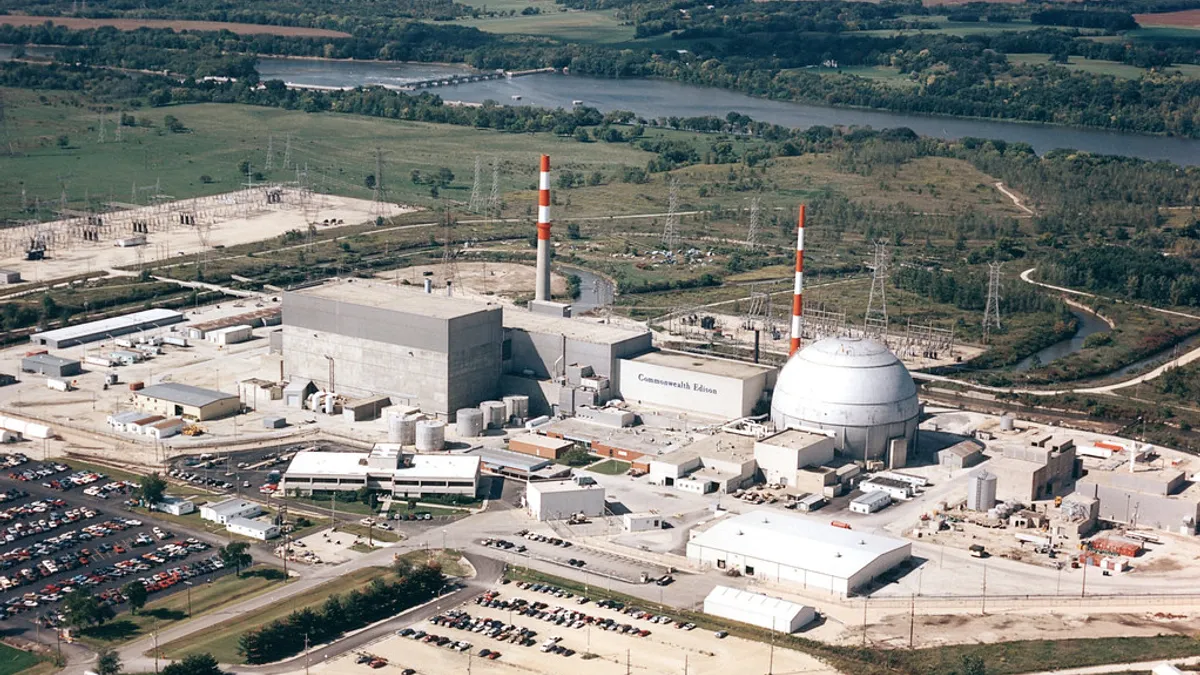Dive Brief:
- Exelon Corp. reports that three of its nuclear plants in Illinois failed to clear the PJM Interconnection's capacity auction last week.
- Exelon, in a filing with the U.S. Securities and Exchange Commission, revealed that its Bryon, Dresden and Quad Cities nuclear plants in Illinois all failed to sell their power at the PJM auction, losing out to other power plants and energy resources. Bryon and Dresden are currently slated to be retired this fall, with Quad Cities remaining open thanks to previously awarded subsidies from the state of Illinois.
- The fate of Illinois' nuclear power sector, meanwhile, remains in the balance, as an impasse drags on in the state legislature over an energy bill that would provide hundreds of millions of dollars in subsidies to the sector.
Dive Insight:
PJM, the regional grid operator which supplies power to 65 million people in thirteen states, made news earlier this week when it held its semi-annual capacity auction.
The grid operator said it secured commitments for power for 2022-2023 at $50/MW-day, compared to the $140/MW-day at the last auction three years ago. That represents a 64% decline.
It also comes on the heels of a study commissioned by the Sierra Club and Natural Resources Council that was critical of the PJM capacity auction. The study by Wilson Energy Economics, argued the previous capacity auction in 2018 resulted in PJM buying too much power at inflated prices.
Susan Buehler, a spokesperson for PJM, declined to comment on the study, but noted, in an email, the auction resulted in significantly lower prices due to "a lower load forecast and reserve requirement," which in turn, "decreases the amount of capacity PJM needs to procure."
There was also a 19% decline in the Cost of New Entry (CONE) or the cost to build a new generator and bring it online, as well as lower bids offered by the various power providers who took part in the auction, the company said.
But for Exelon, the auction decidedly had mixed results, with a number of its nuclear plants slated for closure as a broad energy deal — containing hundreds of millions of dollars in subsidies for the nuclear sector — remains stalled in the Illinois legislature.
Democratic Gov. JB Pritzker has thrown his support behind a sweeping energy bill that includes as much as $540 million in subsidies for Exelon's nuclear plants, according to WBEZ in Chicago.
But with the bill in limbo, state lawmakers earlier this week left the state capitol with the end of the legislative session, WBEZ reported, though legislative leaders have indicated they may call lawmakers back to finish work on key bills.
In its filing with the SEC, Exelon warned that even two nuclear plants that successfully bid to provide power in the PJM auction remain in danger of "premature retirement."
The culprit, the company states, are "unfavorable market rules that favor (carbon) emitting generation."
Exelon said it will keep its Braidwood and LaSalle nuclear plants online through May 2023 in order to "provide time for the significant logistical and technical planning necessary to ensure a safe and orderly retirement."
The plan for an early shutdown, in turn, will take place "in the event policy changes are not enacted," Exelon stated, in an apparent reference to the energy bill stalled in the Illinois Legislature.
Pritzker's proposed subsidies are designed to keep at least three of Exelon's six nuclear plants in the state up and running for the next five years, according to WBEZ.
Maintaining some level of nuclear power has become a big issue, not just in Illinois, but in other states as well as policy makers pursue plans to retire coal plants and other fossil-fueled power plants over the coming decades. Pritzker has set a goal of 2050 for the Illinois' energy sector to become carbon-free.
Synapse Energy Economics, a consulting firm, recommended this spring that Illinois expand its subsidies to more Exelon nuclear plants in the state in order to provide a bridge from fossil fuels to cleaner energy.
The report, commissioned by the state of Illinois, warned that nuclear power and its carbon-free energy is undervalued in wholesale markets.
"This has implications for Illinois's policy goals because the plants generate carbon-free electricity that is currently undervalued or even ignored within current wholesale electricity markets," Synapse found.
One reason nuclear plants in Illinois and elsewhere are struggling to stay open is due to much larger subsidies granted to renewable energy, said James Hopf, policy lead for Generation Atomic, a nuclear power advocacy group.
Another factor is the money nuclear plants are required to spend in order to prevent any sort of contamination, compared to power stations that run on fossil fuels, which face few restrictions on their carbon emissions.
"Nuclear is required to spend huge amounts of money to not even allow a small chance of pollution, while they are forced to compete with fossil sources that are allowed to pollute for free, continuously," Hopf said.
Sierra Club Illinois Chapter Director Jack Darin said when it comes to competing with fossil fuel power plants, the nuclear sector may have a point.
"It is true our capacity market in particular is skewed towards the fossil sources that are polluting our air and making it difficult to meet our clean energy goals," Darin said.
Clarification: The headline of this story has been updated to clarify that three Exelon nuclear plants failed to clear the PJM capacity auction last week.














